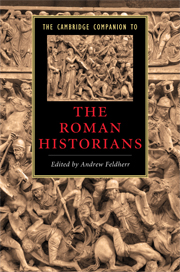Book contents
- Frontmatter
- Introduction
- Part I Approaches
- 1 Ancient audiences and expectations
- 2 Postmodern historiographical theory and the Roman historians
- 3 Historians without history: Against Roman historiography
- Part II Contexts and Traditions
- Part III Subjects
- Part IV Modes
- Part V Characters
- Part IV Transformations
- Chronological list of the historians of Rome
- Bibliography
- Index
2 - Postmodern historiographical theory and the Roman historians
from Part I - Approaches
Published online by Cambridge University Press: 28 November 2010
- Frontmatter
- Introduction
- Part I Approaches
- 1 Ancient audiences and expectations
- 2 Postmodern historiographical theory and the Roman historians
- 3 Historians without history: Against Roman historiography
- Part II Contexts and Traditions
- Part III Subjects
- Part IV Modes
- Part V Characters
- Part IV Transformations
- Chronological list of the historians of Rome
- Bibliography
- Index
Summary
Since the mid 1970s, when “theory” became a powerful new force in the humanities, “history,” as a discipline, has been particularly resistant to the questions and challenges, the debates and aporias of “theory.” Only a few years ago in the journal History and Theory Keith Jenkins composed, in response to Peter Zagorin's attack on postmodernism, a call for “postmodernism sans histoire.” Zagorin, in his rejoinder, concluded that “postmodernist philosophy has little insight into historiography and nothing to contribute that clarifies or illuminates its character as an inquiry or a body of knowledge.” In this chapter, I would like to introduce some of the concerns of postmodern historiography and consider how they may affect the way we use and understand the Roman historians. Postmodernism is not a single theoretical perspective, nor is it easily defined and limited. It can be thought of as a response to the failure of the emancipatory project of modernity. As such, it is primarily a present condition and a prospective project, concerned with how we understand our own world in the context of late capital, American hegemony, mass reproduction of simulacra, modern heteroethnic communities, and a loss of faith in grand metanarratives.
- Type
- Chapter
- Information
- The Cambridge Companion to the Roman Historians , pp. 24 - 40Publisher: Cambridge University PressPrint publication year: 2009
- 6
- Cited by



